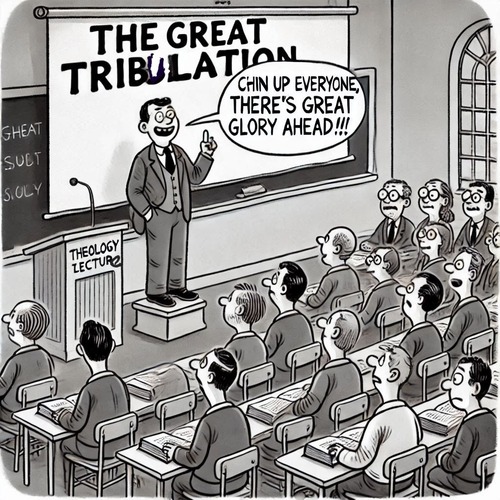What is the Great Tribulation? Understanding Bible End-Time Prophecy
The Great Tribulation is one of the most significant and sobering prophecies in all of Scripture and represents a pivotal period in God’s redemptive plan.
Here is Jesus’ description of this time of unprecedented difficulty: “For then there will be great tribulation, such as has not been from the beginning of the world until now, no, and never will be” (Matthew 24:21). The period, foretold in both the Old and New Testaments, represents the culmination of the world’s opposition to God’s kingdom and the final vindication of His sovereign purposes in history.
BIBLICAL FOUNDATION FOR THE GREAT TRIBULATION
Key Scriptural References: The doctrine is found in several key passages. Daniel 12:1 speaks of “a time of trouble, such as never has been since there was a nation till that time.” Jesus elaborates on this in the Olivet Discourse (Matthew 24), providing the most detailed description of the period. The Apostle John’s vision in Revelation sheds further light on these events, particularly in chapters 7 and 14.
Reformed Hermeneutics: Reformed scholars approach these texts through the lens of covenant theology. They tend to look at all Bible prophecy in the broader context of God’s covenant relationship with His people. This hermeneutical framework emphasises:
- The unity of Scripture’s redemptive message
- The centrality of Christ in all prophetic interpretation
- The continuity of God’s people throughout redemptive history
- The importance of interpreting Scripture with Scripture
THE NATURE OF THE GREAT TRIBULATION
Timing and Duration: The Great Tribulation is to be viewed within the framework of God’s providential working in history. While Reformed scholars propose several chronological frameworks, there is general agreement the period represents the culmination of the church age and the final intensification of opposition to Christ’s kingdom before His return.
Unlike theological traditions that separate Israel and the church in their end-times scenarios, Reformed theology sees God’s people as one—the church comprising both Jewish and Gentile believers united in Christ.
Purpose and Divine Intent: The Great Tribulation serves several sovereign purposes:
- The demonstration of God’s justice in judging a rebellious world: God’s righteousness demands that sin and rebellion face final judgement (2 Thessalonians 1:6-8).
- The purification and strengthening of the church through trial: Just as gold is refined by fire, the church will be purified through this period of intense testing (1 Peter 1:6-7).
- The vindication of Christ’s lordship over all creation: The Tribulation will culminate in the universal acknowledgment of Christ’s supreme authority, fulfilling Philippians 2:10-11.
- The final defeat of all opposition to God’s kingdom: God will decisively overcome all resistance to His rule, establishing His kingdom in its fullness as prophesied in Daniel 2:44 and Revelation 11:15.
This understanding emphasises God’s absolute sovereignty over these events, seeing them not as a deviation from His control but as part of His ordained plan for history’s consummation.
Characteristics of the Period: The Great Tribulation will be characterised by:
- The intensification of spiritual warfare: Satan, knowing his time is short, will launch his most aggressive assault against the church (Revelation 12:12).
- Widespread apostasy and the emergence of false teachings: Many who once professed faith will fall away, fulfilling Jesus’ warning in Matthew 24:10-11. False teachers will arise with unprecedented frequency and persuasiveness.
- Severe persecution of faithful believers: True Christians will face intense opposition—from both religious and secular sources—that surpasses previous examples in both scope and severity (Matthew 24:21).
- Unprecedented natural and social calamities: Creation itself will manifest signs of disorder. Natural disasters and social upheaval of unprecedented scale will occur (Matthew 24:6-7; Luke 21:25-26).
- The preservation of God’s elect through these trials: Despite the severity of this period, God will faithfully preserve His elect. This preservation isn’t necessarily physical protection but rather the sustaining of faith and ultimate spiritual victory (Matthew 24:24).
REFORMED PERSPECTIVES ON THE GREAT TRIBULATION
The Reformers provide important foundations for understanding prophetic literature. John Calvin’s commentary on Daniel and Revelation emphasise the church’s ultimate triumph through tribulation while warning against excessive speculation about prophetic details. The Puritan era produced rich theological reflection on these themes, with writers such as John Owen and Jonathan Edwards developing mature Reformed eschatology.
Over time, Reformed theology has maintained remarkable consistency in its core understanding of the Great Tribulation while engaging contemporary challenges. Key emphases have included:
- The sovereignty of God over all historical events
- The unity of God’s people across dispensations
- The centrality of Christ in prophetic fulfillment, and His ultimate triumphant return—to consummate His Kingdom, execute final judgement, vindicate His people, and establish the new creation.
- The calling of the church to faithful witness amid trials
HOPE FOR THE CHURCH
The Bible provides profound hope for believers, not in escape from the Great Tribulation, but in Christ’s faithful preservation of His people through it. The church can be sure:
- Christ’s victory is certain
- God’s promises are unchangeable
- Divine grace is sufficient for every trial
- Glory awaits beyond present suffering
CONCLUSION
The Reformed understanding of the Great Tribulation, while sobering, is ultimately hopeful. It presents these events not as a defeat of God’s purposes but as their culmination. This doctrine calls believers to steadfast faith, reminding us our sovereign God remains enthroned, working all things according to His perfect will—even in history’s darkest hour. God’s sovereignty extends even over the most challenging periods of human history. As we anticipate these events, we do so not with fear but with faith in Christ’s ultimate victory and the unshakeable security of His people in Him.
THE GREAT TRIBULATION—RELATED FAQs
Is the Great Tribulation the same as the “Day of the Lord”? While these concepts are related, they aren’t identical. The Day of the Lord refers to the final judgement and Christ’s return, while the Great Tribulation describes the period of intense suffering and persecution preceding it. Reformed theology generally sees the Great Tribulation culminating in the Day of the Lord, but they are distinct events in God’s prophetic timeline.
- Will Christians be raptured before the Great Tribulation? From a Reformed perspective, there is no biblical basis for expecting believers to be removed from earth before the tribulation. Scripture instead promises Christ’s preservation of His people through tribulation, as exemplified in John 17:15 where Jesus prays not for removal from the world but for protection within it. The doctrine of a pre-tribulation rapture emerged relatively recently in church history and isn’t supported by traditional Reformed theology.
- How does the Great Tribulation relate to the millennium? Reformed amillennial and postmillennial views typically see the Great Tribulation as occurring at the end of the current age, just before Christ’s return. This differs from premillennial views that place it either before or during a future millennial kingdom. The Reformed emphasis is on Christ’s current reign and its culmination rather than on a future earthly millennium.
- Are the seal, trumpet, and bowl judgments in Revelation sequential or parallel descriptions of the Great Tribulation? Many Reformed interpreters view these judgments as parallel descriptions of the same period rather than strictly sequential events. This recapitulation view sees Revelation presenting the same events from different angles, each cycle intensifying the description while covering the entire church age with particular focus on its culmination in the Great Tribulation.
Will a temple be rebuilt in Jerusalem during the Great Tribulation? Reformed theology typically interprets New Testament references to the temple spiritually, seeing fulfillment in Christ and His church rather than expecting a rebuilt physical temple. Passages about temple desecration are often understood as referring to attacks on the true worship of God within the church rather than events in a future physical building.
- How long will the Great Tribulation last? While some traditions specify an exact duration (often 3½ or 7 years), Reformed theology typically avoids such precise calculations. The emphasis is placed on God’s sovereign control over the tribulation’s length and His promise to limit it for the sake of His elect, as stated in Matthew 24:22.
- How does the Great Tribulation relate to current events and suffering? Reformed theology sees current trials and tribulations as potential precursors or types of the final Great Tribulation, while maintaining that the ultimate fulfillment will be uniquely severe. Present sufferings serve to prepare the church and demonstrate patterns that will intensify in the final tribulation, though we should be cautious about definitively identifying current events as fulfilments of specific prophecies.
How are the Reformed perspectives on the Tribulation different from dispensationalist views? Reformed theology fundamentally differs from dispensationalism in seeing one unified people of God throughout history rather than separate plans for Israel and the Church. This affects tribulation doctrine in three key ways: We reject the idea of a pre-tribulation rapture of the church, we don’t expect a rebuilt physical temple or renewed animal sacrifices, and we see prophetic fulfillment happening through the church rather than primarily through national Israel.
- How do our Reformed views clash with popular culture and media portrayal? Popular media, often influenced by dispensationalist interpretations, typically presents the tribulation through sensationalised scenarios involving dramatic disappearances (the rapture), specific political figures (an individual Antichrist), and highly literal interpretations of prophetic imagery. Reformed theology takes a more measured approach, emphasising Christ’s present reign, the church’s role in tribulation, and the symbolic nature of apocalyptic literature. We also reject the popular “Left Behind” scenario of a secret rapture, seeing it as a relatively recent theological innovation without historical or biblical foundation.
- Will every believer have to undergo Tribulation of some sort? Reformed theology, based on passages such as Acts 14:22 (“through many tribulations we must enter the kingdom of God”) and 2 Timothy 3:12, teaches all believers will experience tribulation in some form. While not every Christian will experience the final Great Tribulation, we’re all called to endure various trials and persecutions as part of our faithful witness to Christ. The intensity and nature of tribulation may vary, but Scripture promises both its certainty for believers and God’s faithful preservation through it.
THE GREAT TRIBULATION—OUR RELATED POSTS
Editor's Pick

The Throne-Room Vision: Who Did Isaiah See?
The scene is unforgettable: Isaiah stands in the temple, and suddenly the veil between heaven and earth tears open. He [...]

The Angel of the Lord: Can We Be Certain It Was Christ All Along?
Throughout the Old Testament, a mysterious figure appears: the Angel of the LORD. He speaks as God, bears God’s name, [...]
SUPPORT US:
Feel the Holy Spirit's gentle nudge to partner with us?
Donate Online:
Account Name: TRUTHS TO DIE FOR FOUNDATION
Account Number: 10243565459
Bank IFSC: IDFB0043391
Bank Name: IDFC FIRST BANK






